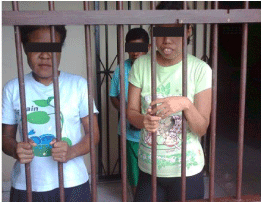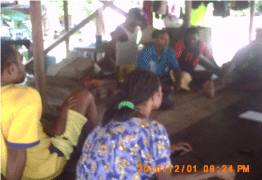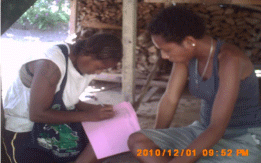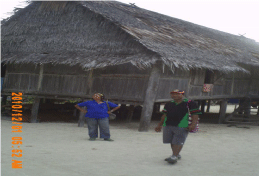Abstract
Objective: To understand the extent of the youth and communities as a whole in Wutung village the knowledge of health problems, especially regarding to the mental health problems and how to cope in the event of mental health disorders.
To see how they look at their daily lives of the two nations in which when the transaction with the goods happen then once the exchange of cultural values, in this case the people of PNG adopts from the people of Indonesia or vice versa are very influencing patterns of behavior that result the advantage or disadvantage.
To know consequences of cultural exchange as a result of a very close relationship that affect patterns of thinking of different principles that impose unacceptable for something other than what they believed and understood in their daily lives.
Method: A descriptive epidemiological study focusing on health issues, health care seeking behavior and knowledge of mental health were use participatories approaches and observation including indepth interview, focus group discussion. The study was incorporating both qualitative and quantitative elements, 205 respondents were recruited and 70% of it is youth both male and female.
Result: The research in border between PNG and Papua Province Indonesia was presented in UPNG by author include mental disorder and level on it.
Conclusion: Basically young people more interested in something new and exciting and in this case they are interested in the lifestyle of the people from neighboring countries where they easily get what they want without realizing they begin to lose their culture little by little that affect the mental health which is contrary to the lifestyle of parents and their ancestors, which must be challenged by those who would create a conflict of inner terrific resulting in disruption their mental health.
This causes great health environment change between the two countries. From 70% of youth in the village of Wutung as a respondent can speak bahasa Indonesia (100%), 50% have a motor bike which used to transport passengers from village to market/kiosks or garden return for a fee that cost according to agreement between driver and a passenger, the rest had a wheelbarrow carrying goods cargo market from village to market return with a small fee agreed anyway and this is done by a male or female youth. The above activities are circumstances in Indonesia wide rather than in PNG, but due to living in close proximity as neighbors then it is adopted by the PNG children while the children of Indonesia would like to learn to speak in English and Pidgin. It causes youth of PNG ignore their culture of farming and fishing and it raises big conflict between parents and children. Many elderly people being rude, beating their children, even prohibit leave the house, which causes discouraged of youth and did not go to school anymore. We found only 20% of youth of Wutung village- PNG went to school and only about 12% have graduated from grade 12 and the rest of it drop out. The girls are forced to marriage at the age of 12 Year old up where it not ready in physically and mentally causes into divorce and separation. Their desire to be like children in Papua-Indonesia is not achieve due to hit with the mindset of parents and elders in village. These PNG youth most vulnerable and under pressure by parents, premature married, financial, health problem and much more causes many who experience mental disorder, health impaired and about 12% mental disorder, 2% were treated at Mental Health Hospital, Abepura-Papua Province Indonesia (the research team went to Indonesia side to visit it).
Keywords: Mental disorder; Stressor; Environmental influence; Stress and life change
Comment
Wutung village-PNG lies approximately equidistant from Vanimo General Hospital (VGH) PNG and Mental Health Hospital Abepura, Abepura General Hospital, Abepura Dian Harapan Hospital (belong to Catholic Church) and Hamadi Health Centre in Papua Province Indonesia. Travel time and cost are approximately the same as are the cost of outpatient and impatient care. Used descriptive epidemiological study to people at Wutung village and Papua Province Indonesia are cross the border everyday (7 days) and the gate in border between the two countries is open at 8am-6pm. 67% of respondents confess that easier to take patient in emergency especially in the night to Papua province Indonesia than to Vanimo General Hospital-PNG on various reason. Transportation is main problem for people living in this village and the only way is use PMV which it cost more. Uneducated, premature married, financial problem, law income, divorce, drug and alcohol, conflict with parents, village elders, environment influence, change of life style, produce mental disorder for the youths of Wutung village. There are long way to go to help the youths in this village. Partnership between two countries to solve the problem faced by villages is crucial and the government from both countries should take responsibility for the better future life of this generation (Figures 1 and 2).

Figure 1: Mental disorder patients from the two countries-PNG and Indonesia.

Figure 2: Focus Group Discussion with youth, Wutung village-PNG. Jenny
(22) at the back and Mina (18) at the right (patients from Wutung village-PNG)
with Wahyuni Patient from Indonesia in Mental Health Hospital Abepura-
Papua Province Indonesia, mental disorder patients where we visit them on
December 3rd, 2012.
We do Focus Group Discussion (FGD) to youths in gather their opinion. 100% of participants want to better life. They are already stressing out with environment in their village, no movement. That’s why they love to go to Papua province to treatment and medication, shopping, pleasure and for business (Figures 3 and 4).

Figure 3: Photo taken at Wutung village in interview time. Adelle (white
T-shirt) was train by me to do interview with Tina, young mum who suffered
from her marriage.

Figure 4: With my co-investigator MPH student, in front of our accomodation
at Wutung village (Author in blue T-shirt).
Recruited 6 youths both male and female from this village as a volunteer to help research team to do interview most helpful. Data were collected on time and of course we respect their time and effort [1-6].
Conclusion
Simplicity of the two nations to and fro in border is “like wide open gate” to produce kind of problem which these youths focus on alcohol and drugs, sex transaction, change life style, lose of culture, including pushing wheel barrow and motor cycle rodding. These temporary employment put more difficulties on financial, as well as caused to marital problem, divorce, conflict between elders and youth, religious problem, disrespectful to parents and elder of village and most of it the future life of youth in this village is hopeless. It’s also temperamental, emotional and rough. Do not care their partner and children. The desire and longing to be like youth in Indonesia not achieved made youth in Wutung village so desperate, discouraged. There is no willingness to go forward because it collided with changing of life style and pressures by parents and elders of village. It caused mental disorder, a severe psychological stress with a result that some of youth were in Jail in Papua province Indonesia and 2% as a patients of mental disorder in Mental Health Hospital at Abepura- Papua Province Indonesia.
References
- Cecil G Helman. Caring and Curing, the sector of health care in Culture, Health and Illness. 1994.
- Patricia Thownseno P. The situation of children in Papua New Guinea. 1985.
- Margaret Spencer. Public Health in Papua New Guinea. 1870-1939.
- Institute of Medical Research (IMR). National Study of Sexual and Reproductive Knowledge and Behavior in PNG. 1994.
- Ministry of Health. National Health Plan 2001-2010: Provincial and District Health Profiles Vol II, Part two. 2000.
- Muga Florence. Poor People-Rich Country; article submitted to Australasian Psychiatry as a result of the Nation Island Course. 2015.
